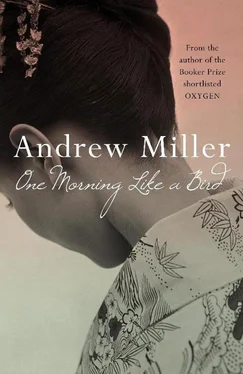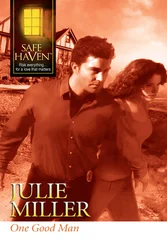Two days after the telegram and the letter, Emile develops a fever. One moment he is lying placidly in Alissa’s lap, the next his limbs are rigid. He blinks, woken by some event deep in his body, then fires from his mouth a stream of creamy vomit. When it stops he howls. Alissa rocks him, gives him the breast his hands and mouth are fumbling for. Yuji cleans the vomit from the sofa, from the rug. Splashes of it have reached even the wall behind the table. He has just finished, is carrying the bucket back to the kitchen, when the baby, rolling his head from the nipple, is convulsed a second time.
What is an infant’s grip on life? How tenacious? Can it slip away in an hour while his parents hover over him, ignorant and terrified?
A third attack, a fourth.
‘There’s a woman,’ says Alissa, ‘opposite the fan shop at the end of the street. She has children of her own. I know she sometimes looks after others . .’
Her name is Kiyama. She follows Yuji through the evening blue of the snow. She asks no questions. She has not even taken off her apron. She comes into the house, bows to Alissa, and kneels on the floor. The child, panting on his mother’s lap, lets the stranger handle him. She unpins his nappy and sniffs at it, gently palps the distended belly, looks over his skin for signs of something she evidently does not find.
‘What a ni-ice little baby,’ says the woman, sounding like a collector pleased to have found an unusual specimen so close to home.
‘Is it serious?’ asks Alissa. ‘Should we call a doctor? Every time he’s sick his whole body shakes . .’
‘You really speak Japanese!’ says the woman, laughing and showing off her tobacco-stained teeth. ‘How clever you must be. Don’t worry about baby. Keep giving him your milk. You have a lot of milk?’
‘I think so.’
‘Keep him close to you, against your skin, like a little husband.’ She laughs again and looks at Yuji. ‘You have to sleep somewhere else tonight. Mother doesn’t have strength for you too.’
As he thanks her at the door, he digs a five-yen note from his pocket. ‘It’s too much,’ says the woman decisively. He takes out some change. In the end she accepts one yen and fifty sen, tucking the coins beneath her apron.
The vomiting continues but the intervals between each attack grow longer. Eventually, a few minutes before eleven, it stops. Alissa and the child sleep on the sofa, a single creature again as if Saramago’s scissors had never put them apart. Yuji brings them a blanket from the spare room, then goes to the kitchen, rinses the cloths and hangs them to dry. Back in the salon, he puts wood into the stove, lets a little of the fragrant smoke spill out to cover the smell of sickness, yawns until he shudders, and sleeps in the armchair opposite the sofa, waking, moments later it seems, in a room packed with light, Alissa and Emile playing together on the floor. All sense of crisis has fled with the night. When he stirs, she looks at him, her face fresh as the morning.
‘I’m going to cut your hair,’ she says, grinning. ‘It’s starting to stick out over your ears. People will make comments.’
He goes out for food. The sun, already high, glints on melting ice and snow. He buys croquettes from the stand by the university, then, out of sheer good spirits, stays to talk with the vendor. Is business better in the cold weather?
‘Better for the pocket,’ says the man, ‘but worse for the feet.’
‘We were up all night with our son,’ says Yuji. ‘He gave us quite a fright, but this morning he’s well.’
‘That’s how they are,’ says the man. ‘Your first?’
‘Yes.’
‘You’ll get used to it,’ he says. ‘I’ve got five.’ He gives Yuji an extra croquette, for free. ‘Nothing like a croquette for keeping up your strength,’ he says.
At the house, the bag of steaming food and two cups of mugi-cha make an instant party. The child who seemed so sick is now entirely restored. They look at him, wonderingly, and recount to each other the incidents of the night before, the vomiting, the visit, their own alarm, as a kind of comedy. How odd the woman was! And how absurd she should be so surprised by Alissa speaking Japanese! (‘She must have seen me on the street for years.’) Wiping the grease of the food from her fingers, she sits at the piano, plays Mozart, Bach, Debussy. Last of all she plays the Chopin.
‘You remember it?’ she asks.
He nods. The room is briefly filled with ghosts. She lowers the lid over the piano keys. After a while she says, ‘Let’s go outside.’
In the garden, they walk slow circles round the magnolia tree, Alissa in her fleece-lined boots, Emile with his red wool bonnet on, a Christmas present from Rose or Sandrine, or perhaps Natasha. Needing one hand for her stick, she holds the baby in the curve of the other arm, and when the arm is tired she passes him to Yuji.
‘Wouldn’t it be nice,’ she says, as motes of snow, the first of a fresh fall, dance around them, ‘if he could remember this.’
‘The garden?’ asks Yuji.
‘And us,’ she says. ‘All together.’
Inside again, they read, doze, eat. In the warmth of the salon they are starting to have the intimacy of stabled animals. Dusk falls. From the street comes the scrape, scrape of someone shovelling snow. A woman calls her children in.
Alissa takes a bath. ‘Do you want my water?’ she asks, leaning, pink-faced, into the salon. So he lies in her water. The bath is enamelled iron, forged, perhaps — the scale is suggestive — by the same foundry that made the stove. He has not been in a bath like this before. His toes are on a level with his nose. The hardware of the taps has a nautical gleam, industrial, but if this is a good example of a foreign bath, then the foreigners have not quite understood. How reassuring that is! A weakness at last. He lies with his head on the cushion of curled iron. The water smells of roses. A bulb behind a half-globe of white glass burns unevenly, and below, over a wooden rack, a pair of stockings is hanging next to three squares of drying cotton, the baby’s nappies.
‘There are towels in the cupboard,’ she calls through the door. ‘And I put out one of Papa’s old robes. It’s a bit moth-eaten . .’
He comes back into the salon wearing the robe. It’s maroon and gold silk, the sort of garment he imagines an African princeling wearing, perhaps in a place like Harar. There are indeed moth-holes in it.
‘Very nice,’ she says, looking as if she might start to laugh.
‘Is he feeding still?’
‘No,’ she says, glancing at the baby’s head. ‘He’s asleep. Can you help me move him?’
Kneeling by her feet (roses, roses . .), he takes the child’s weight as she rolls him from her breast, then lifts him to the end of the sofa and lies him there. Though still asleep, the child pushes out his lips in some infant reflex of suckling.
‘It must be good milk,’ says Yuji. ‘He even dreams of it.’
‘I put a drop on my finger,’ she says. ‘I wanted to see what it tasted like.’
‘And?’
‘A little bit sweet. Would you like to try some?’
‘Wouldn’t I be stealing it from him?’
‘Don’t worry about that,’ she says. ‘Even when he feeds half the night I wake up with my breasts so full they ache. See how swollen they are even now?’
When his lips close round one of her nipples it stiffens against his tongue. He sucks but cannot at first make the milk come. He has forgotten how to. She touches his hair and with her other hand gently squeezes the base of her breast. ‘There,’ she says. ‘Is it coming now?’
He slides his arms round her waist. His mind darkens with the old bliss. The milk comes surprisingly fast, warm as the skin it flows through and, as she told him, slightly sweet. He keeps some of it in his mouth, then lifts his head from her breast and lets the milk slide from his mouth into hers. She tenses, shivers, then bites his lip, nips it hard enough to bring a little blood away, just beside where her father cut him with his ring. He dabs it with his hand. ‘Sorry,’ she says, smiling and pushing a finger through one of the moth-holes in his gown. ‘What a mess we’re making of your beautiful face.’
Читать дальше












